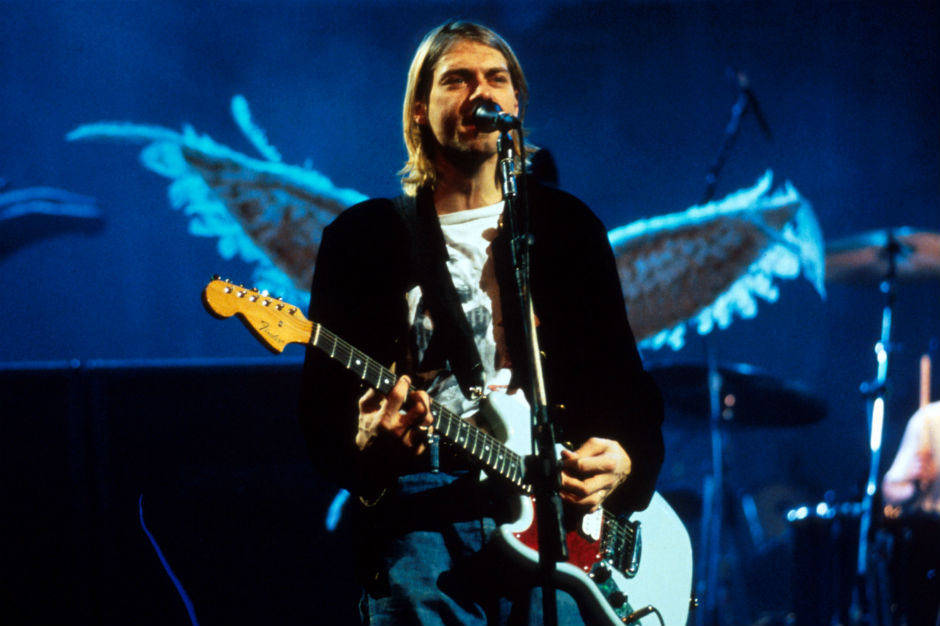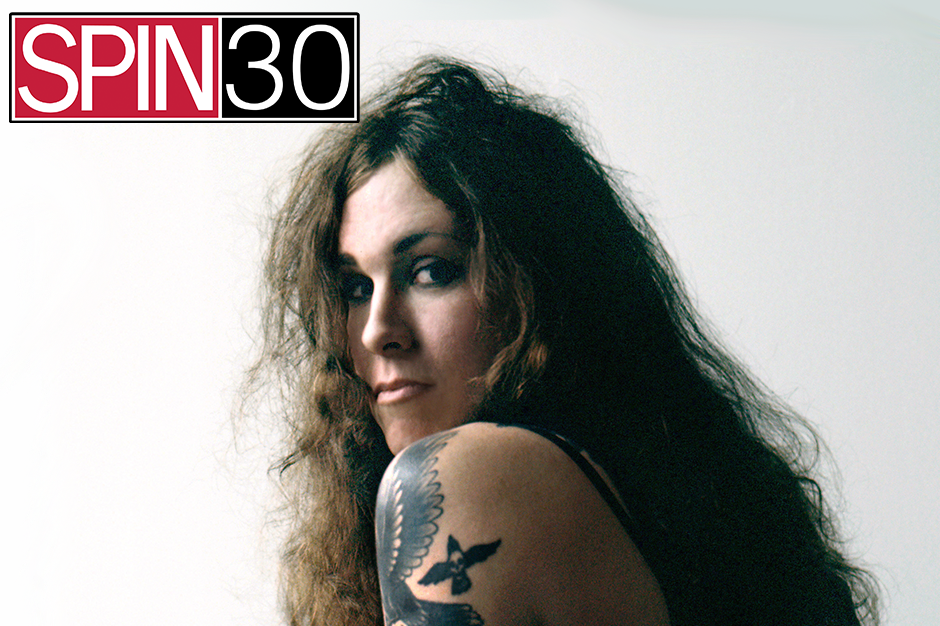On March 19, 1985, the first issue of SPIN hit newsstands. To celebrate our 30th anniversary, we’re revisiting a handful of records that the staff has previously awarded “Album of the Year,” a distinction the magazine started giving out in 1990.
Punk-rock bands have been battling the “sellout” label for decades. Generally speaking, a band’s earliest fans tend to take the most umbrage with the idea of signing with a major, lending songs to advertisements, playing arenas — or whatever that outdated phrase means in 2015 (ska staples Reel Big Fish even had a joke song about this very issue). Gainesville acoustic-punk heroes Against Me!, too, fought against fan (and critic) reactions in 2007 when they went from the Fat Mike-run Fat Wreck to the Warner-owned Sire Records to record New Wave.
Against Me!’s fourth album wasn’t without the strain of frustration that fueled the band’s previous works (2002’s Reinventing Axl Rose, 2003’s As the Eternal Cowboy, 2005’s Searching for a Former Clarity), but it did boast glossier production than its boisterous, marble-mouthed predecessors, thanks in no small part to studio guru Butch Vig. “I think that on paper we did make so many of the classic mistakes that a punk band makes, signing to a major label, getting in business with the wrong people, stuff like that,” Against Me! lead singer Laura Jane Grace says over the phone. “But we lucked out in the one area, in that Butch Vig was there.” Despite receiving pushback from the Warped-Tour crowd, New Wave was crowned SPIN‘s Album of the Year in 2007 and Against Me! nabbed hoards of new fans (the LP’s second single, “Thrash Unreal,” hit No. 11 on the U.S. Modern Rock Chart, their biggest hit to date), many of whom continued to support Laura after she came out as trans in 2012 — a personal journey encapsulated on 2014’s bracing Transgender Dysphoria Blues.
Below, SPIN talks with Grace, who recounts New Wave‘s commercial success, backlash from then-longtime fans, and why no one ever thought to ask about a particularly telling lyric from “The Ocean.”

Also Read
THE DAY THE MUSIC DIED
Do you remember when New Wave was named SPIN‘s Album of the Year in 2007?
I do, yeah. I remember that we were playing in Michigan when we were told that it was named Album of the Year. It didn’t really register in a weird way. It was so out of left field, completely unexpected. Things were really rough and rocky on the road for us. I had gotten arrested, and then all of a sudden there was this really great news, and we were all just sitting backstage just like, “Huh, wow.”
What happened with the arrest?
I got arrested in an incident in Tallahassee, Florida, or whatever, where I got into an altercation with someone. So I had these charges over my head, and I was like, “Fuck!” It sucks to be on tour thinking, “I have to deal with court shit. I’m miles away, we have a European tour coming up.” We were touring really hard before the record came out. I think what happened was, our grand mistake of everything in the New Wave album — if you want to look at it like that — was we started everything with a tour with Mastodon, which took about 20 years off of my life.
Did you feel at the time that there was pushback from fans who felt betrayed at your going to a major label?
Completely, yeah, and it had been such a long, drawn-out thing, too. We had already gone through the recording process with major labels that turned the previous album [Searching for a Former Clarity] down. So the next time around, we ended up going with Warner. It was kind of this tug-and-pull thing that was difficult. Some people were going to see New Wave one way, and other people were going to see it and listen with an open mind. A lot of people had, with that record, already decided, like, “This is a major-label record. It’s a big, huge sell-out record.” We were put in this position between people that we really couldn’t win.
What was your immediate reaction to the “sellout” stuff? Did you feel zen about it, or were you more like, “Fuck this”?
I think that’s the knee-jerk reaction that happens. Obviously, when I was 23 years old and going through this, people were physically trying to fight us, slashing our tires. Stuff like that puts you in a really dissenting place. I definitely, at times, had that attitude of “Fuck you.” But the thing that I was taught with punk rock was: Think for yourself. Don’t listen to what other people tell you. Be happy to live your life. So I’ve only ever made decisions based on the facts that I’ve known to be true. A lot of that, I’m sure, was hard to explain to people, especially if you look at an album like [2010’s] White Crosses, thinking… well, obviously I was reconciling a lot of things in my life, and what happened next. I was still wrapped up in all that, so my narrative at the time of all of these records was completely different than other people’s.
The first record we made, we recorded and mixed in a day. The second record was recorded and mixed in a week. The third was recorded and mixed in a month, and New Wave was mixed and recorded in six months. It was an epic project. Butch Vig was a true friend and really guided us, and it was such a fulfilling relationship with a person to make records with.
Did signing to Sire led directly to working with Vig, or were you going to work with him independent of signing with a major?
From a budget standpoint we wouldn’t have been able to work with him had we not signed to a major label, period. As to whether or not the label itself had an influence on that, or the A&R people involved, I do think, to some extent, yeah. It’s kind of this cliché that you sign to a major label and then they ask you, “What producer do you want to work with?” And everyone, of course, says all the biggest names for producers: Rick Rubin, Butch Vig, you know. That’s who every A&R person brings out because they want you to swing for the fences, but most of the time that’s not a reality.
I do think that going with Sire in particular, our intentions were truer. Our aim was true in that Sire was the home of the Ramones, the Replacements, Echo and the Bunnymen, Morrissey — so many of those artists. We were like, “Well, they’re a major label, and they’re owned by Warner now, but at the same time, it’s Sire.” Seymour Stein was a part of it — he would come and hang out and come to shows. He would stand behind my amplifier for a whole show, you know? And he’s like 80-something years old, and he’s sweating it out at a punk-rock show. There were legitimate intentions behind that working relationship that I felt good about.
I think of New Wave and White Crosses as college, and this was my thesis. Like, this is what I learned, I’m really thankful to have worked with you, and this is what I picked up of your techniques.” That’s an incredible feeling to have, especially for someone like myself, who’s a fucking high-school dropout. That’s the education that I’ve always wanted. I don’t want to go to a university; that’s the kind of education I wanted.
How was it working with Tegan Quin on “Borne on the FM Waves of the Heart”?
The summer previous to it, I had an interview with Tegan for some Canadian music show (MuchMusic) where she interviewed me. So we talked, and I liked her; she was cool. When I was driving out to record New Wave, me and Andrew [Seward, former Against Me! bassist] drove from Florida to L.A., and Butch was like, “You gotta write one more song.” So I wrote that song on the drive out and specifically thinking, “It’d be really cool if Tegan could sing this. This could work for Tegan. I want her to do it, and this is how I want it to be.” So I just emailed her and asked her to come, and she came and did it. It worked out, it was really one of those easy things that was kind of meant to be in that way.
We had the same A&R person, Craig Aaronson — who recently passed away — who signed us and Tegan and Sara. So there were connections behind the scenes with a lot of bands that were happening there, especially with Craig. He was the one who signed Mastodon, too. We toured with Mastodon through Craig, pretty much, and it was crazy because it was so recent that he passed away. For a period of time, there was an A&R person at a major label, and that really defined it for me. A lot of that’s gone now. The people who worked on New Wave do not work at Warner Bros. anymore. They’re all gone. It’s a dying art.
On the song “The Ocean,” there’s a line that says: “If I could have chosen, I would have been born a woman / My mother once told me she would have named me Laura.” How’d you feel writing that at the time?
To be honest, I wrote that song when we were on tour in Europe on a day off. They had cancelled a show — it was too far of a drive. So, we did this really bourgeois thing and got hotel rooms and just spent the day hanging out on the beach, drinking wine and having a huge dinner. After dinner, I went out on the beach and that song was just there. I wrote it down in ten minutes just sitting on the beach, and it was fully formed, the lyrics and the chorus and everything. At the time when I was writing, I really wasn’t thinking about what I was saying, and then obviously, when I went back and reread it, I was like, “Oh shit, I gotta play this for other people.” I was aware of the line and I was outing myself, and I asked everyone’s attention and if it struck anyone as weird, but no one ever said anything. They were kind of just like, “Yeah, go for it.” I thought it was going to be something people would ask about, and no one ever asked anything about it.
No one ever asked about it in interviews?
Nothing. Never, nothing. The record label didn’t want us to put that song on, and that’s why it’s the last song on the record. They were like, “Okay, I guess. Put it last on the record.” And I was just like, “Fine.” It’s been a song that’s stayed in our set list more than most of the other songs on that record… Every single Against Me! album has songs about gender dysphoria on it. Every single one. It’s just that some of them weren’t as direct as others.
If anyone had asked, what do you think you would have said?
I’m not sure, because I look at it really as my subconscious pushing me toward accepting something and coming out with something, but I was obviously teasing at it and toying with it. We made a video for the song “Thrash Unreal” and I was like, “This sucks, this is the biggest piece of shit video.” But for the original concept of the video, I wrote a treatment where I was dressed as a woman. It was exploring those themes in the video, but A&R wouldn’t greenlight it. So we’re doing this shitty video where I’m shirtless and lying. [Laughs.]
If you indirectly referred to gender dysphoria in lyrics, do you think your coming out came as less of a shock to your bandmates?
Well, I came out to my band at the studio, and on the drive back, James [Bowman] was replaying things from many years of our friendship. He was like, “Oh, that makes sense. Oh, okay, now I get that.” It’s regrettable that I couldn’t have just been more direct and come out with it. Most stuff is so simple. Like, Andrew used to do this thing before we go on stage where he’d slap us on the back and just go, “All right boys, let’s go!” It would just make my skin crawl. And he was just trying to be nice. He wasn’t doing it maliciously, but there was no way I could say it at the time. [There were] so many things like that throughout the day that would bring me down and make me a miserable person to be around. But you live and you learn, I hope.
What are your favorite memories associated with New Wave? How do you look back on it today?
You know, I really think that it was the culmination of four people working together: me, Andrew, James, and Warren. Unfortunately, it was really the last thing that the four of us worked together on, and so, in that way, it really was a view to a certain era of time. I look back on that time really fondly, and I’m really thankful to have experienced all the things that we experienced because of that record — the bad and the good. Even the lessons learned through the bad, that you still have to think for yourself, and just because some people say it’s some way doesn’t mean it’s that way.
I regret that things got messy after that, because [Sire] really was a major label at the time. We got in at the last minute where you could get a super stupid amount of money, and they didn’t make you give away publishing and merchandise and everything like that. It was a really traditional record deal. We took one of those last roller-coaster rides where things are just ridiculous, and you do these ridiculous things. At the other end, there’s the wreckage, and I regret some of the wreckage, but I don’t regret taking the ride. It was just really… It was fun.




